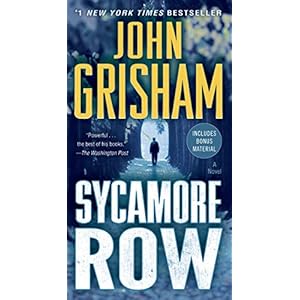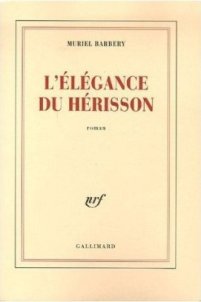 Grisham is back! Really? That’s what I wanted to believe as well. At first, Sycamore Row is full of atmosphere: the southern little town, the colorful waitress, the flavorful dialogues. So I am happy to find Grisham again, and with a humor bonus on top of that, at least at first. Not that he is humorless in other works, but here the rural settings seem to stimulate his wit and sass, despite the morbid start of the novel and its important topic.
Grisham is back! Really? That’s what I wanted to believe as well. At first, Sycamore Row is full of atmosphere: the southern little town, the colorful waitress, the flavorful dialogues. So I am happy to find Grisham again, and with a humor bonus on top of that, at least at first. Not that he is humorless in other works, but here the rural settings seem to stimulate his wit and sass, despite the morbid start of the novel and its important topic. We are in the 1980's, in a Mississippi little town where the sheriff and one of the judges tend to stretch the law one way or the other, and where racism has far from disappeared. Readers who know Grisham well have visited the place already, and met most characters in A Time to Kill, Grisham’s first novel. Here, a black woman is about to inherit millions from a white man at the expense of his family. Some issues arise from this. The duty to one’s family is one. A significant anti-racist statement is another. You could add this: the freedom to do what one wants with one’s own fortune. What is more important in life—the personal or the civic? What if the personal and the historic were one and the same?
All these problems are posed, somewhat addressed, never really explored.
Too bad. Sycamore Row could have been fascinating, the stuff of great literature, with such a title, too! But if it is gripping in the beginning and interesting in the end, what it is in the middle is too much like small towns and not enough like good writing: so dull and soporific that you want to get drunk with Lucien—the alcoholic and debarred lawyer of the novel.
At the end of each one of his novels, Grisham usually addresses his readers, evoking the epopee of the writing of that particular book. Here, he tells us that his wife Renée, “was not too keen on a sequel” of A Time to Kill, which many readers consider his masterpiece.
Renée, I believe you were right.

 If you’re afraid of going back to the classics because you like page turners, don’t be! At least not with Rebecca. I revisited the novel for pace reasons. Let me explain. I am working on a literary mystery and I was in need of some inspiration and sustenance not so much for plot as for rhythm and tension. Rebecca, the forerunner of the psychological thriller, happened to be the perfect choice. Of course, I mixed business with pleasure for the novel is, as mentioned before, vastly entertaining. Something Du Maurier wanted. With time, it acquired a lot more than commercial value and became quite an important literary work.
If you’re afraid of going back to the classics because you like page turners, don’t be! At least not with Rebecca. I revisited the novel for pace reasons. Let me explain. I am working on a literary mystery and I was in need of some inspiration and sustenance not so much for plot as for rhythm and tension. Rebecca, the forerunner of the psychological thriller, happened to be the perfect choice. Of course, I mixed business with pleasure for the novel is, as mentioned before, vastly entertaining. Something Du Maurier wanted. With time, it acquired a lot more than commercial value and became quite an important literary work.
 So once upon a time (okay a couple of days ago) a person with a mild case of claustrophobia had to go through an MRI. Personnel at the hospital failed to reassure her. The MRI operator told her he couldn’t stand the thing himself without tranquilizers. So with the help of all this comforting and her own writer’s imagination, she swallowed a couple of pills before entering hell on earth, that dark, airless tunnel that would attack her from all sides. The day came, the moment. A half-spheric glass shape was placed above her head. Great. Now, she looked like a robot. A button was pushed and she glided into a tube, the tube. And then, what? It stopped and she could actually see the light at the end of the tunnel. Literally. And there was plenty of air circulating around her. She said: “That’s it? That’s what I am supposed to be afraid of? That’s why I got myself spaced out for?”
So once upon a time (okay a couple of days ago) a person with a mild case of claustrophobia had to go through an MRI. Personnel at the hospital failed to reassure her. The MRI operator told her he couldn’t stand the thing himself without tranquilizers. So with the help of all this comforting and her own writer’s imagination, she swallowed a couple of pills before entering hell on earth, that dark, airless tunnel that would attack her from all sides. The day came, the moment. A half-spheric glass shape was placed above her head. Great. Now, she looked like a robot. A button was pushed and she glided into a tube, the tube. And then, what? It stopped and she could actually see the light at the end of the tunnel. Literally. And there was plenty of air circulating around her. She said: “That’s it? That’s what I am supposed to be afraid of? That’s why I got myself spaced out for?”

 THE BIG SLEEP is Chandler’s first novel and this is my Chandler’s first read. So I’ll tell you what strikes first: it’s Chandler’s writing style, the ironic voice of private detective Philip Marlowe, a man who drinks too much, smokes too much and, we suspect, uses smoke and drink to hide personal wounds. The man is as much a mystery as the plot itself which, in places, gets messy and overcharged. What draws the reader to this novel, besides the style and voice, is the atmospheric charm of the descriptions. It’s hard to imagine so much rain in Los Angeles. But Chandler makes his suspension of disbelief effective. Besides, the rain may stand for something else. As does the wealthy family he works for, in ruins. There is a social commentary subtext here. Perhaps not so much of a subtext as a theme as Chandler associates decay with the City of Angels. At times, you feel as if you are entering the lonesomeness of a Hopper painting (think "Nighthawks"). And it may be why Chandler is part of literature.
THE BIG SLEEP is Chandler’s first novel and this is my Chandler’s first read. So I’ll tell you what strikes first: it’s Chandler’s writing style, the ironic voice of private detective Philip Marlowe, a man who drinks too much, smokes too much and, we suspect, uses smoke and drink to hide personal wounds. The man is as much a mystery as the plot itself which, in places, gets messy and overcharged. What draws the reader to this novel, besides the style and voice, is the atmospheric charm of the descriptions. It’s hard to imagine so much rain in Los Angeles. But Chandler makes his suspension of disbelief effective. Besides, the rain may stand for something else. As does the wealthy family he works for, in ruins. There is a social commentary subtext here. Perhaps not so much of a subtext as a theme as Chandler associates decay with the City of Angels. At times, you feel as if you are entering the lonesomeness of a Hopper painting (think "Nighthawks"). And it may be why Chandler is part of literature.